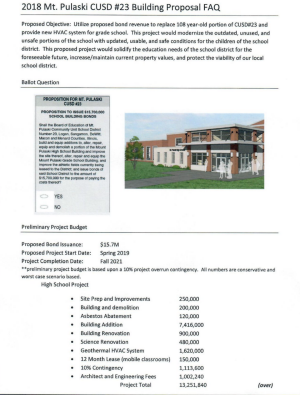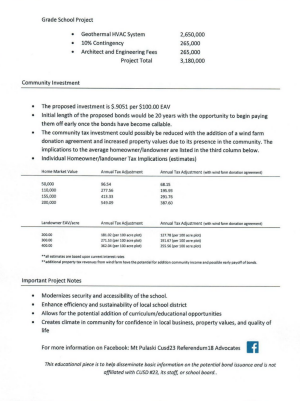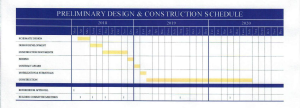|
 The goal
of the building project and referendum is to improve the safety,
security, efficiency and sustainability at the high school by
replacing the existing 108-year-old building and remodeling portions
of the remaining existing high school. The safety and health
concerns within the existing high school include poor security of
entrances, narrow corridors that present safety issues for students
and staff, lack of a fire suppression system, and noncompliance with
current Americans with Disabilities Act requirements. Other building
deficiencies, a result of the outdated mechanical, electrical, and
plumbing systems, include the high costs of ongoing maintenance and
repairs, failure to meet current energy codes or fresh air
requirements, limited amount of toilets, and lack of energy
efficient fixtures. The construction would transform the high school
into a more functional and robust learning environment for the Mount
Pulaski student populace. The goal
of the building project and referendum is to improve the safety,
security, efficiency and sustainability at the high school by
replacing the existing 108-year-old building and remodeling portions
of the remaining existing high school. The safety and health
concerns within the existing high school include poor security of
entrances, narrow corridors that present safety issues for students
and staff, lack of a fire suppression system, and noncompliance with
current Americans with Disabilities Act requirements. Other building
deficiencies, a result of the outdated mechanical, electrical, and
plumbing systems, include the high costs of ongoing maintenance and
repairs, failure to meet current energy codes or fresh air
requirements, limited amount of toilets, and lack of energy
efficient fixtures. The construction would transform the high school
into a more functional and robust learning environment for the Mount
Pulaski student populace.

The goal of the school board is to decrease the financial impact of
the building project on the community members and tax payers by
seeking every opportunity to offset the project costs. Some
opportunities for alleviating the impact to tax payers is through
Resolution 2018-1 and windfarm property tax revenue (these are
described in further detail as you continue reading).
The ballot will read:
PROPOSITION TO ISSUE
$15,700,000 SCHOOL BUILDING BONDS
Shall the Board of Education of Mount Pulaski Community Unit School
District, Number 23, Logan, Sangamon, Dewitt, Macon and Menard
Counties, Illinois, build and equip additions to, alter, repair,
equip and demolish a portion of the Mount Pulaski High School
Building and improve the site thereof, alter, repair and equip the
Mount Pulaski Grade School Building, and improve the athletic fields
currently being leased to the District; and issue bonds of said
School District to the amount of $15,700,000 for the purpose of
paying the costs thereof? YES or NO
The Advocacy group believes that the “school district
and community will benefit from the addition of these facilities and
that they will help to provide a safe atmosphere for our children to
learn and prepare for life.” They encourage community members to
“reach out to the group with any questions on the bond issuance that
you may have.” They are working hard to spread the referendum
message and to provide answers to all questions surrounding this
topic.
Please see the detailed Building Proposal FAQ sheet below. Advocates
have been reaching out to businesses and community members to
provide them with the fact sheet and to answer any questions and/or
concerns.
 [to
top of second column] |


If the
referendum passes, the picture below is the potential timeline for
design and construction. The preliminary work, for such things like
design, development, and the bidding process will take nearly the
rest of 2018. The projected construction start date is in the spring
of 2019 and will continue into the summer of 2020. There will be
mobile classrooms provided for a year that are already factored into
the budget costs.

Advocates and school board members frequently get asked questions
about how the proposed bond issuance works and how taxes will be
affected? A bond is essentially a loan. The school will issue a
twenty (20) year bond for said amount of dollars. It is then paid
back over that time by means of taxes. Taxes are assessed on your
home or farmland based off the county’s EAV. If the value of your
property or EAV stays the same every year, taxes will only go up the
amount of the bond issued and for that allotted time frame.

The Mount Pulaski School District has recently signed into effect
Resolution 2018-1 on February 20, 2018. This resolution states that
the school board will be utilizing the annual donation from
Hilltopper Wind Power, LLC to offset capital project debt service
and partially abate the corresponding tax levy. According to School
Board President, Doug Martin, the school board “will use the
donation strictly for the building project which will reduce the
effect to the taxpayer”. Martin continues, “There will also be
property tax revenue generated, thus reducing the net effect to the
taxpayer”.
The School Board has spent endless hours contemplating and deriving
the best plans to fix the issues that the school buildings are
experiencing. The plan explained above is the most attainable for
the sustainability of District 23. As mentioned previously, health
and safety issues are being addressed along with ADA compliancy,
plus much more.
[INFORMATION SUBMITTED BY RENEE
MARTIN] |